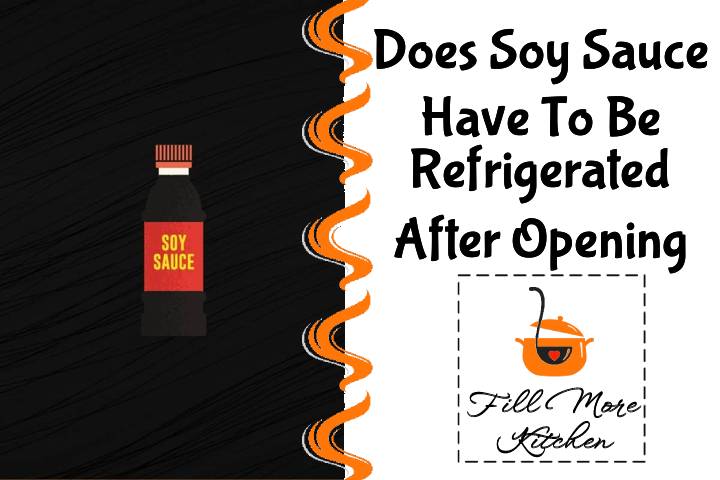When you last visited a Chinese restaurant, you might have noticed a bottle of soy sauce placed on the table and questioned its duration and whether it requires refrigeration.
Refrigeration is not necessary for opened soy sauce as it has undergone fermentation and has a high sodium content, preventing spoilage at room temperature. Nevertheless, its quality may decline over time if not stored in the refrigerator.
Kikkoman, a major producer of Soy Sauce, states that leaving it out on the counter or table won’t cause it to spoil. Nevertheless, if not refrigerated, its flavor may diminish over time.
Soy sauce has been a significant component in Asian cuisine for over 2,000 years since its inception in China and has now become a widely used condiment globally.
Soy sauce usually contains only four components: soybeans, wheat, water, and salt, with the flavor potentially differing slightly based on the method of fermentation and recipe.
Although the process of making soy sauce varies by brand, it typically involves combining mashed beans and wheat to create a paste, followed by the addition of mold cultures like Aspergillus oryzae and other microorganisms to initiate fermentation.
Once a few days have passed, water and salt are incorporated into the mixture, and the process of fermentation persists for approximately 6 to 8 months. Afterward, the paste is squeezed to obtain the sauce.
After pasteurization, the soy sauce is packaged into bottles.
Due to its high salt content, fermentation, and pasteurization, soy sauce can be stored at room temperature and still remain edible for up to a year.
Chinese restaurants use up soy sauce quickly, which is why it tastes fine there. However, if you don’t use soy sauce often at home, it’s recommended to refrigerate it.
What’s The Best Way To Store Soy Sauce?
When it comes to storing soy sauce, the question arises whether to keep it at room temperature or refrigerate it and if the storage method affects its quality.
Whether or not you should refrigerate soy sauce after opening it depends on how often you use it; if you use it frequently, it can be stored on your table or counter alongside salt and pepper, but if not, refrigeration between uses will enhance its flavor.
Once the bottle is opened, make sure to keep the soy sauce in its original container and secure the lid tightly. If it is not sealed correctly, mold can form due to contaminants entering the bottle.
Kikkoman recommends not adding water or any other ingredients to soy sauce before storing it, as these may deteriorate and spoil the sauce.
Kamada, another soy sauce producer, suggests that you keep the condiment in a cool, dark place whether it has been opened or not.
So, if you decide not to store it in the refrigerator, ensure that you keep the soy sauce away from any heat source such as a stove and consider storing it in a cabinet or pantry.
While it is possible to keep soy sauce at room temperature, it is important to take into account the definition of “room temperature” in your specific household. In the event that your home lacks air conditioning during a warm summer, the room temperature may become excessively hot and unsuitable for both you and the soy sauce.
Kamada, like Kikkoman, suggests refrigerating soy sauce to preserve its optimal flavor quality. The bottle’s slender shape allows for convenient storage in the refrigerator.
It is not required to put soy sauce in the freezer, and due to its high salt content, it may not even freeze. You can keep it in the fridge for a couple of years.
Can Soy Sauce Go Bad?
Although soy sauces typically lack preservatives, their fermented nature prevents spoilage, breakdown, or any potential harm to consumers. The only possible outcome is a gradual loss of flavor over time.
Occasionally, you might observe white particles drifting on top of the soy sauce or adhering to the bottle’s interior. These particles are not mold, and the soy sauce remains edible.
The film yeast, which is a type of yeast, may alter the aroma or flavor of soy sauce, but it is not harmful and will not cause food poisoning.
If there is a layer of yeast on top of your soy sauce, it is safe to remove it and the remaining soy sauce will not be affected.
In order to prevent the development of film yeast, some varieties of soy sauce contain a small amount of alcohol.
How Can You Tell If Soy Sauce Has Gone Bad?
Like any other food item, soy sauce also has a limited shelf life and its taste deteriorates over time. So, how can you identify when it’s no longer suitable for consumption?
As time passes, the flavor, color, and texture of soy sauce will decline. It is advisable to taste your bottle of soy sauce before using it on your meal if it has been sitting unused for a while.
Although consuming expired soy sauce won’t cause illness, it can negatively impact the taste of your dish or spoil the flavor of your fried rice. Therefore, it is essential to assess the quality of your soy sauce before using it.
Begin by examining the soy sauce visually, and if its color appears significantly darker than expected, it may have exceeded its optimal freshness.
Afterward, uncork the container and inhale. An unusual or unpleasant odor is an additional indication of a decline in quality.
The most reliable method to determine if soy sauce is still suitable for consumption is by sampling it. Aged soy sauce will have a potent or sour flavor.
If the soy sauce remains tasty, it is safe to utilize, otherwise, dispose of it.
How Long After Its Expiration Date Can Soy Sauce Be Used?
It might be simpler to assess the quality of your soy sauce if you had an expiry date to refer to. Nevertheless, most soy sauces don’t have an expiration date on the label.
Most brands typically include a best-by date on their label, which serves as an estimation of when the flavor quality may begin to deteriorate.
Nonetheless, the suggested expiration date is merely an estimation made by the producer as the taste deterioration occurs progressively and relies on various elements, including the storage method of soy sauce and its exposure to elevated temperatures.
As time passes, soy sauce will darken and intensify in taste. The level at which this becomes unappetizing may vary depending on individual preferences.
Refrigerating soy sauce can extend its flavor, and it can remain fresh for a maximum of two years when stored in the fridge.
Do Soy Sauce Packets Need To Be Refrigerated?
After getting some soy sauce packets from a Chinese restaurant take-out, is it necessary to refrigerate them and what is their shelf life?
The soy sauce found in those small packets is identical to the one sold in bottles, although certain brands may include synthetic colors and flavors. Some of them also contain preservatives, which eliminates the need for refrigeration.
Unopened packets of soy sauce can last longer than bottled sauce, with a reasonable estimate of about two to three years.
It can be worrisome to discover a collection of soy sauce packets in the rear of your refrigerator since they typically lack expiration dates.
If you are uncertain about the age of soy sauce packets, perform a similar examination to that of bottled sauce by opening the packet, observing the sauce’s appearance, smelling it, and sampling it.
Similar to bottled soy sauce, refrigerating soy sauce packets can help maintain their freshness.
You can also check this video about “Does Soy Sauce Have To Be Refrigerated After Opening?”
Check out our top 10 reviews!
Related posts
https://fillmorekitchen.com/this-is-how-long-you-can-keep-dirty-dishes-in-the-sink/
https://fillmorekitchen.com/is-it-better-to-slow-cook-on-low-or-high/
https://fillmorekitchen.com/can-you-really-drink-expired-tea/
https://fillmorekitchen.com/why-your-cast-iron-smells-how-to-neutralize-it/
https://fillmorekitchen.com/do-electric-grills-produce-smoke/



